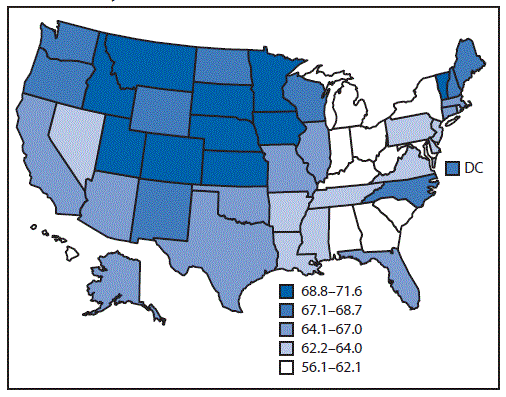
Age-adjusted percentage of adults who reported ≥7 hours of sleep per 24-hour period, by state, from a 2016 Center for Disease Control and Prevention report.
I know I’m preaching to the (dark-eye-circled) choir here, but it seems like every day, there’s a new study that extols the importance and benefits of sleep. The Zzzz’s-news bombshell in February was that one in three—a full third of American adults—don’t get enough sleep. Last week, it was about how hard it is to resist Cool Ranch Doritos when you’ve had less than five hours of sleep.
As a morning glory, I naturally start to wind down around 8 pm. On nights I’m not in bed by 9:30, I have a minor freak-out, knowing how significantly sleep—or lack thereof—can affect my mood, my outlook, my interactions with others. My tendency towards depression is directly related to sleep; the less shut-eye I have, the more powerful my depression feels. When I don’t have a solid 8ish hours, having a positive and pleasant perspective the following day can be a real struggle. It sounds dramatic, but it’s my truth.
So when somebody on Twitter asked me recently to share my sleep hygiene—an awkward word combo if I ever knew one, btw—I bit. Again, I am naturally a morning person, so if you’re not, these might feel completely awkward. Also, my kids are now nine and twelve, so they only disturb my sleep when they’re sick or having a bad dream, which happens once a month, max.
—I go to bed at what many would consider a ridiculously early hour. 9 pm most nights, and often earlier. Whenever I stay up late to get something done, my work is subpar and needs an additional polish when I’m rested. I’ve learned I’m better off getting up what many would consider ridiculously early—5 am—to get something urgent done I wasn’t able to complete the day before. (The bonus when this happens? I usually run around lunch, in the daylight, in the sun. I’m finding I actually prefer that rhythm more than an early morning run.)
—I get ready for bed 30 minutes before I want to crawl under the covers. Not only does changing into my PJs, brushing my teeth, washing my face, and whatever else I need to do to bring a sense of closure to the day, it also eliminates that I-need-to-go-to-bed-but-I-have-no-energy-to-get-there hurdle. Honestly, sometimes I’ve sat through an extra hour of a Shark Tank marathon simply because the momentum necessary to get ready for bed felt too monumental.

If you set one to remind you of bedtime, you will be awesome.
—I’ve heard people set alarms to go to bed—a brilliant idea, in my mind, if you’re a night owl and/or tend to look up from surfing the sale items at Banana Republic and think, “Where did an hour just go?”
—I exercise. No duh, right? But I find it’s a really fine line. An hour or less of exercise, and my eyes close pretty quickly after I get in bed. After long runs and races, though, I’m still pretty ramped up 12 hours later. It’s usually a night of tossing and turning. I’ve learned to just expect the turmoil, then the following night, I’m extra diligent about winding down early.
—I keep the room cool, much to my husband’s chagrin. I’m not peri-menopausal yet, but I have that special female superpower where I can wake up with a soaked T-shirt, no apparent reason why. Even on the chilliest nights, the window over my side of the bed is slid open at least a crack, and if I had my way, the ceiling fan would spin all year long. Experts say 65 degrees is ideal, but I’m more of a 62-degree devotee.
—I don’t eat much the hour or two before bed. Please don’t mistake: that doesn’t mean I don’t eat too much during the day (that happens regularly) but I’ve realized a full stomach in the evening often translates to a restless sleep. That means I occasionally wake up at 2 am with a gurgling belly. When that happens, I slip down the stairs, grab a banana (and slap some PB on it, if I’m extra hungry), and head back to bed.
—I rarely take my phone into the bedroom—and I definitely don’t charge it there. I’m not a no-screens-in-bedroom purist; I regularly watch movies on my laptop in bed, but Netflix and texts/emails are two different animals. I really try to avoid the latter.
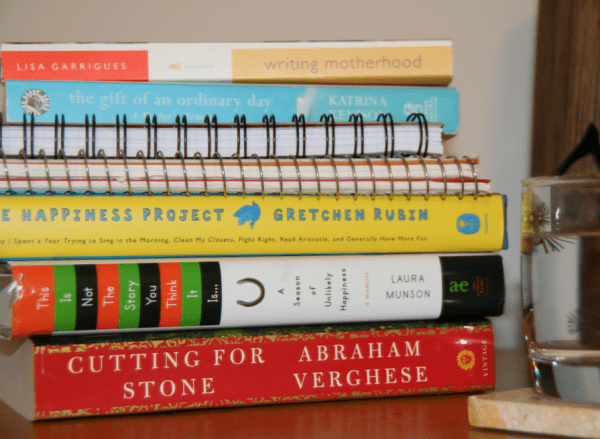
Not the pile of books near my bed: just a representation. (This is way neater.)
—I always read before I fall asleep. I’ve come home from a party at 11 pm, and turned on the light to read, even if it’s only a few pages that I don’t remember the next day. Written words are like my lullaby—even Stephen King could put me to sleep. I realize this is likely genetic. Grant, my husband, is the opposite: He starts a book, and can’t put it down for hours.
—I have a God’s in-box, an idea straight from my hero Anne Lamott; if that’s not your thing, worry dolls or journals work the same way. When something is weighing on my mind so much, I can’t let it go, I write it down and put it in His/Her inbox, which lives on my jewelry box. The simple act of moving it from my head, through a pen, to a place where it can live away from my body is surprisingly liberating.


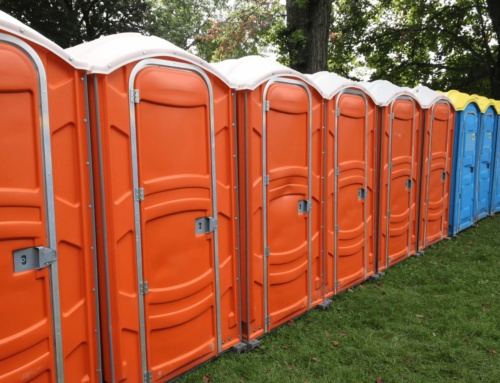
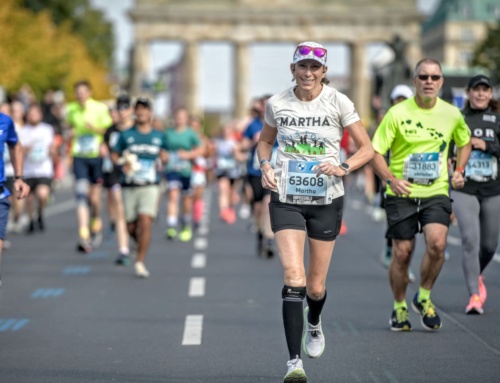
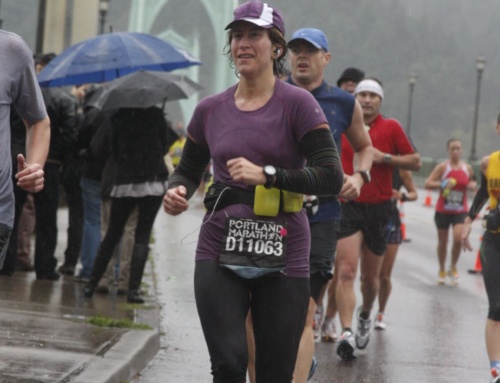
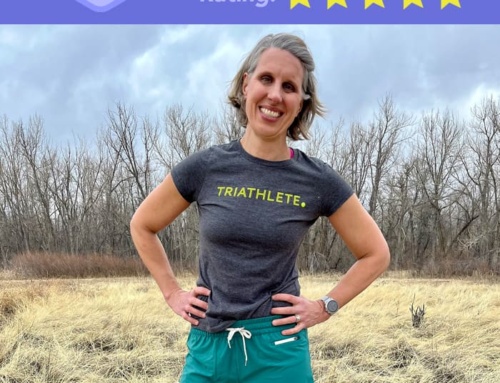
Geez Dim, we could be bunk buddies. The hubby calls me anal but all of that “settling in” works for me. I also pull the shades, turn down the bed, quick warm shower if needed, put on moisturizer, get out of day clothing, all that stuff way before I go to bed. Kind of like when I get to the bedroom I’m ready to go. All that last minute stuff adds up and gets me wound up again. It’s like warming up or stretching before a run, there’s a mind body connection and you’re giving your subconscious a little head’s up that the day’s over, time to slow down. We don’t have a TV in the bedroom and never a phone. If it’s an emergency, call the house phone. I also love Yogi Soothing Caramel Bedtime tea. (herbal and yummy)) Lastly, bad news Dim, those sweaty t-shirts? I’m sure you know those hormonal fluctuations can start years before perimeno actually hits. Just another head’s up from mother nature. :)
While I don’t leave a window open all year round, I prefer 58F or even a bit lower for sleeping. I’m cursing currently as we are experiencing warm up and I have packed up my linens already. I have to unpack so I have something other than flannel sheets for now.
Try turning off all electronics – I’m better at suggesting this than at doing it – 30-60 minutes before bed. It does help.
I can relate so well to you Dimity! There is a direct correlation to my sleep and depression too. Of course there are other things, but not enough sleep is definitely related. I have learned I need to be in bed and hopefully asleep by 9, 9:30 max. Lately, there are more interruptions in my routine than I care for, some my fault, some just family stuff. I need to start getting ready for bed at 8:30 though, you have some good tips. The last week or so I just fall asleep on the couch and then my husband tells me to go to bed. That leads to bad hygiene!! But when I am on my game, I like to have a cup of tea at 8:30 then get washed and in PJs. I also like to read a little then sleep. I do sleep pretty hard, but those dang dogs sometimes have to go in the middle of the night. I hate that!
The winding down ritual is very soothing for me. No phone, clean face, clothes selected for morning and comfy jammies that announce tot he family that I’m finished for the day. I don’t quite make it to the bedroom that early but when I do, it’s lovely.
If I lie down on the sofa while watching TV, I will inevitably fall asleep. I liken this to taking a nap before I go to bed. I really do sleep much better. I think its because anything that may be on my mind has already gone through the thought process while I doze off napping, then when I get up to go to bed, I can fall right back asleep because I have a clear mind.
Yes! Bed by 9pm! Sometimes even 8:30. I have a running group that starts at 7pm and they don’t understand why I don’t join them more often. Well, if I run that late then there is no way I am settling down for bed until 10 or so and that ruins me for the next several days. And, like you Dimity, I too need to read a few pages before calling it a night. It gives me a nice divider between the rush of the day and dream time!
I can completely relate to this! I had a very similar routine pre-baby. In grad school I would set my alarm for 4 or 5 to get up and write, indulge in a leisurely coffee/ breakfast ritual, and go to a yoga class. And reading before bed! So luxurious. Even if it’s just a page or two. Alas, my 1-year-old shares a room with us, and still gets me up 3-4 times/ night. My (naturally night owl) husband is kind enough to take her when she wakes up for the day at 6am so I can catch another hour of sleep.
(oh, and I’m all about the cold room. unfortunately, hubby and baby are most definitely not.)